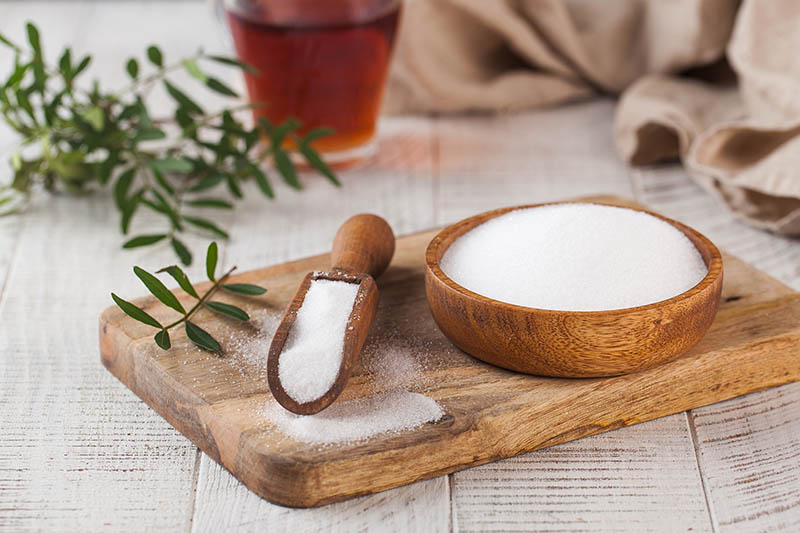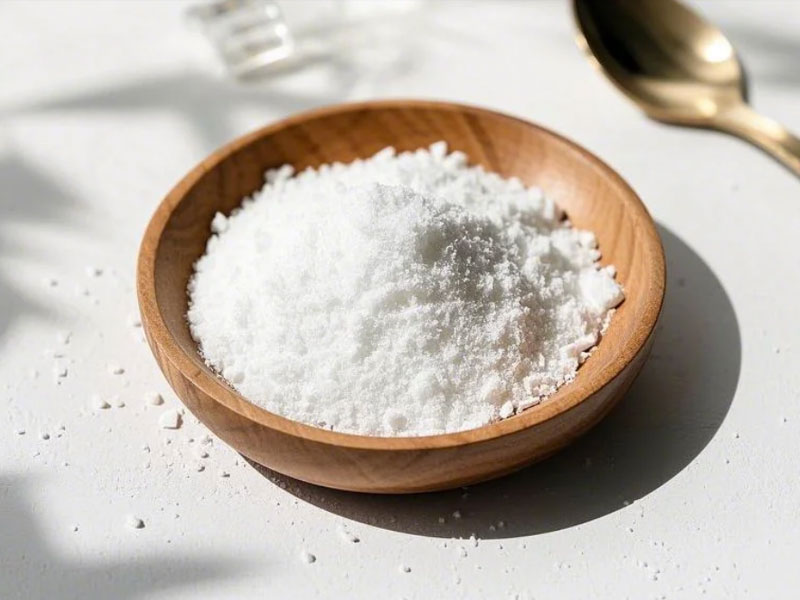As dog owners more and more search for healthier substitutes for their pets, allulose powder has been discovered as one possible sugar substitute in dog food. But is allulose powder safe for dogs? This article explores the pros and cons of using allulose powder for dogs, giving you evidence-based information to make wise choices.
What is Allulose?
Allulose, or D-psicose, is a naturally occurring rare sugar with limited amounts present in food sources such as figs, raisins, and jackfruit. Chemically identical to fructose, allulose has nearly 70% of the sucrose sweetness yet contains much less in terms of calories-some 0.2 to 0.4 kcal/g as opposed to 4 kcal/g for common sugar. Allulose is ingested and then excreted by the body without being metabolized, unlike other sugars.

Key Benefits of Allulose Powder in Animal Feed
1. Improved Energy Metabolism: Allulose provides energy without a high glycemic response, which is especially beneficial for animals with specific metabolic needs. By enhancing energy availability, allulose can support growth and activity levels in livestock.
2. Weight Management: Overfeeding and obesity in certain animals can lead to health issues and reduced productivity. Allulose can aid in weight management by reducing the caloric load of the diet while maintaining a palatable and enjoyable feed experience for the animals.
3. Gut Health and Digestive Support: A healthy gut is essential for optimal nutrient absorption and overall health. Allulose acts as a prebiotic, promoting the growth of beneficial gut bacteria. This leads to better digestion, reduced instances of gastrointestinal disorders, and improved feed efficiency.
3. Reduced Risk of Diabetes in Companion Animals: In pets such as dogs and cats, diabetes is a growing concern. Allulose's ability to regulate blood sugar levels without spiking insulin makes it an ideal ingredient in pet food, particularly for animals prone to diabetes.
4. Enhanced Palatability: The natural sweetness of allulose improves the taste of feed, making it more appealing to animals. Enhanced palatability ensures consistent feed intake, which is crucial for maintaining productivity in livestock and ensuring the health of companion animals.

Advantages of Allulose for Dogs
1. Low Glycemic Effect
One of the greatest advantages of allulose is its very low effect on blood glucose levels. Research has indicated that allulose blunts plasma glucose and insulin rises following oral glucose challenge in dogs, and thereby has possible advantages for diabetic or insulin-resistant dogs.
2. Weight Management
Due to its low-calorie composition, allulose can prove to be an effective weapon in controlling your dog's weight. Substituting high-calorie sugars with allulose in foods and treats can minimize caloric intake without compromising flavor.
3. Oral Health
As opposed to common sugars, allulose is not fermented by oral bacteria, which lowers the chances of dental cavities and plaque formation. This characteristic renders it a safe tooth-friendly substitute for dog treats.

Risks and Considerations
1. Gastrointestinal Distress
Although allulose is well tolerated, it may cause gastrointestinal disturbances at high doses in dogs. Vomiting in one dog and five dogs with transient diarrhea were observed in a safety study of D-allulose in dogs given 4 g/kg of D-allulose. Nevertheless, all the dogs were active and were eating well during the course of the study.
2. Long-Term Safety
Long-term exposure tests have shown that D-allulose at 0.2 g/kg administered daily is not toxic in dogs. Within a period of 12 weeks, no differences were observed in liver enzymes, renal function parameters, or electrolytes between the control and D-allulose groups.
3. Not for All Dogs
Although allulose is safe for most dogs, individual sensitivities may occur. Monitoring your dog for signs of reaction when adding allulose to their diet is important. Signs of vomiting, diarrhea, or appetite change should encourage withdrawal and a veterinary consult.
Comparison with Other Sweeteners
It's important to distinguish allulose from other sweeteners, particularly xylitol, which is extremely toxic to dogs. Even a small amount of xylitol can induce severe hypoglycemia, seizures, liver failure, and death in dogs. Allulose, however, doesn't have such toxic effects and is safe if used properly.

Recommended Dosage and Administration
According to existing research, it is best to take a conservative stance when adding allulose to your dog's diet:
- Dosage: Begin with a low dose, e.g., 0.1 to 0.2 g/kg of body weight per day.
- Monitoring: Monitor your dog for signs of gastrointestinal upset or other side effects.
- Consultation: Always consult with your veterinarian prior to making drastic changes to your dog's diet, particularly if your dog has pre-existing health issues.
Conclusion
Allulose powder offers a promising alternative to conventional sugars in dog food, with benefits such as low glycemic effect, weight management support, and dental health benefits. Although normally safe, care should be taken when introducing allulose, observing your dog's reaction, and speaking with a veterinarian to confirm it meets the individual needs of your pet.
References
Matsuo T, Baba Y, Hashiguchi M, et al. Single oral dose safety of D-allulose in dogs. Journal of Veterinary Medical Science. 2016;78(8):1345-1349.
Nishii N, Takashima S, Matsubara T, et al. The long-term safety of D-allulose administration in healthy dogs. Journal of Veterinary Medical Science. 2017;79(11):1855-1861.
Walden LA. Antihyperglycemic effect of D-allulose in dogs given oral glucose. DVM360. 2016.
American Kennel Club. Artificial Sweeteners: Which Ones Are Safe for Dogs? 2023.










